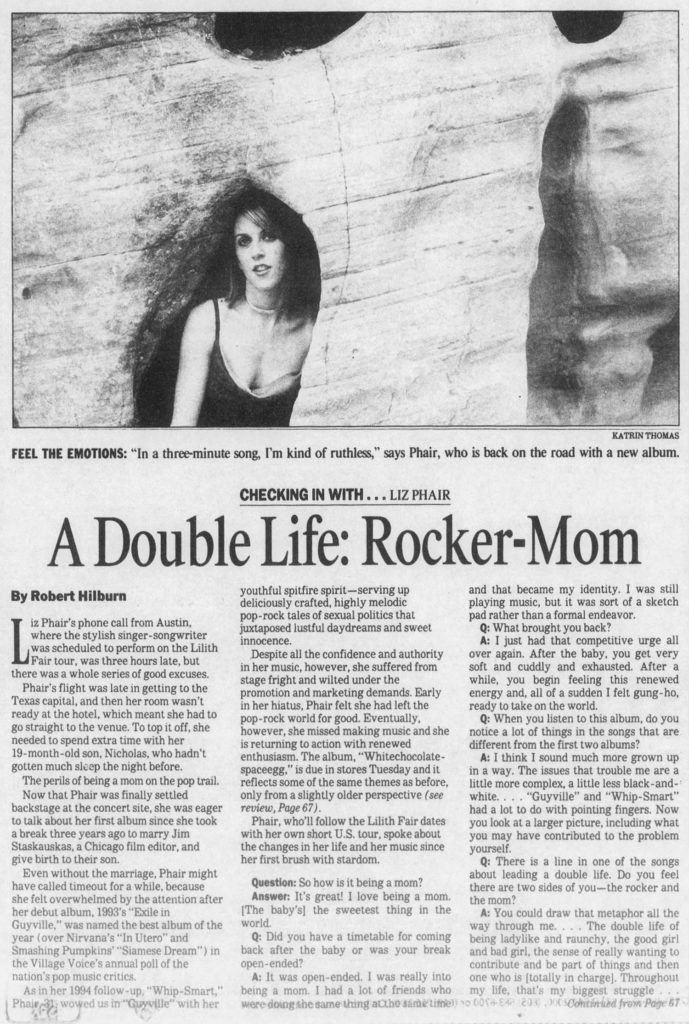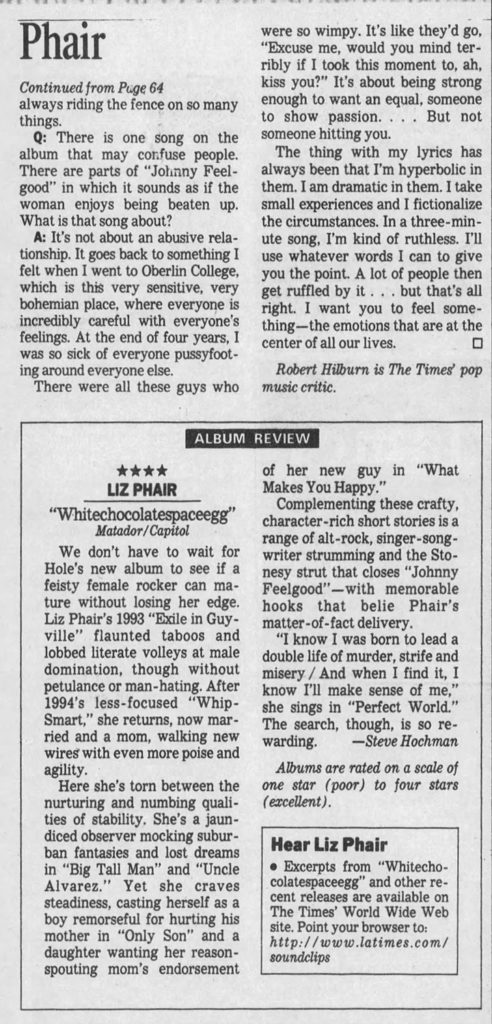Checking in with… Liz Phair
Liz Phair’s phone call from Austin, Texas, where the stylish singer-songwriter was scheduled to perform on the Lilith Fair tour, was three hours late, but there was a whole series of good excuses.
Phair’s flight was late in getting to the Texas capital, and then her room wasn’t ready at the hotel, which meant she had to go straight to the venue. To top it off, she needed to spend extra time with her 19-month-old son, Nicholas, who hadn’t gotten much sleep the night before.
The perils of being a mom on the pop trail.
Now that Phair finally was settled backstage at the concert site, she was eager to talk about her first album since she took a break three years ago to marry Jim Staskauskas, a Chicago film editor, and gave birth to their son.
Even without the marriage, Phair might have called timeout for a while, because she felt overwhelmed by the attention after her debut album, 1993’s Exile in Guyville, was named the album of the year (over Nirvana’s In Utero and Smashing Pumpkins’ Siamese Dream) in the Village Voices’s annual poll of nation’s pop music critics.
As in her 1994 follow-up, Whip-Smart, Phair, 31, wowed us in Guyville with her youthful spitfire spirit — serving up deliciously crafted, highly melodic pop-rock tales of sexual politics that juxtaposed lustful daydreams and sweet innocence.
Despite all the confidence and authority in her music, however, she suffered from stage fright and wilted under the promotion and marketing demands. Early in her hiatus, Phair felt she had left the pop-rock world for good. Eventually, however, she missed making music and she is returning to action with renewed enthusiasm. The album, Whitechocolatespaceeg released last week, reflects some of the same themes as before, only from a slightly older perspectives.
Phair, who’ll follow the Lilith Fair dates with her own short U.S. tour, spoke about the changes in her life and her music since her first brush with stardom.
QUESTION: So how is it being a mom?
ANSWER: It’s great! I love being a mom. (The baby’s) the sweetest thing in the world.
Did you have a timetable for coming back after the baby or was your break open-ended?
A: It was open-ended. I was really into being a mom. I had a lot of friends who were doing the same thing at the same time and that became my identity. I was still playing music, but it was sort of a sketch pad rather than a formal endeavor.
Q: What brought you back?
A: I just had that competitive urge all over again. After the baby, you get very soft and cuddly and exhausted. After a while, you begin feeling this renewed energy and, all of a sudden I felt gungho, ready to take on the world.
Q: There is a line in one of the songs about leading a double life. Do you feel there are two sides of you — the rocker and the mom?
A: You could draw that metaphor all the way through me… The double life of being ladylike and raunchy, the good girl and bad girl, the sense of really wanting to contribute and be part of things and then one who is (totally in charge). Throughout my life, that’s my biggest struggle… always riding the fence on so many things.
Q: There is one song on the album that may confuse people. There are parts of Johnny Feelgood in which it sounds as if the woman enjoys being beaten up. What is that song about?
A: It’s not about an abusive relationship. It goes back to something I felt when I went to Oberlin College, which is this very sensitive, very bohemian place, where everyone is incredibly careful with everyone’s feelings. At the end of four years, I was so sick of everyone pussyfooting around everyone else.
There were all these guys who were so wimpy. It’s like they’d go, “Excuse me, would you mind terribly if I took this moment to, ah, kiss you?” It’s about being strong enough to want an equal, someone to show passion… But not someone hitting you.
The thing with my lyrics has always been that I’m hyperbolic in them. I am dramatic in them. I take small experiences and I fictionalize the circumstances. In a three-minute song, I’m kind of ruthless. I’ll use whatever words I can to give you the point. A lot of people then get ruffled by it… but that’s all right. I want you to feel something — the emotions that are at the center of all our lives.
By Robert Hilburn
Press & Sun Bulletin, August 27, 1998
Featured image by Stephen Apicella-Hitchcock







